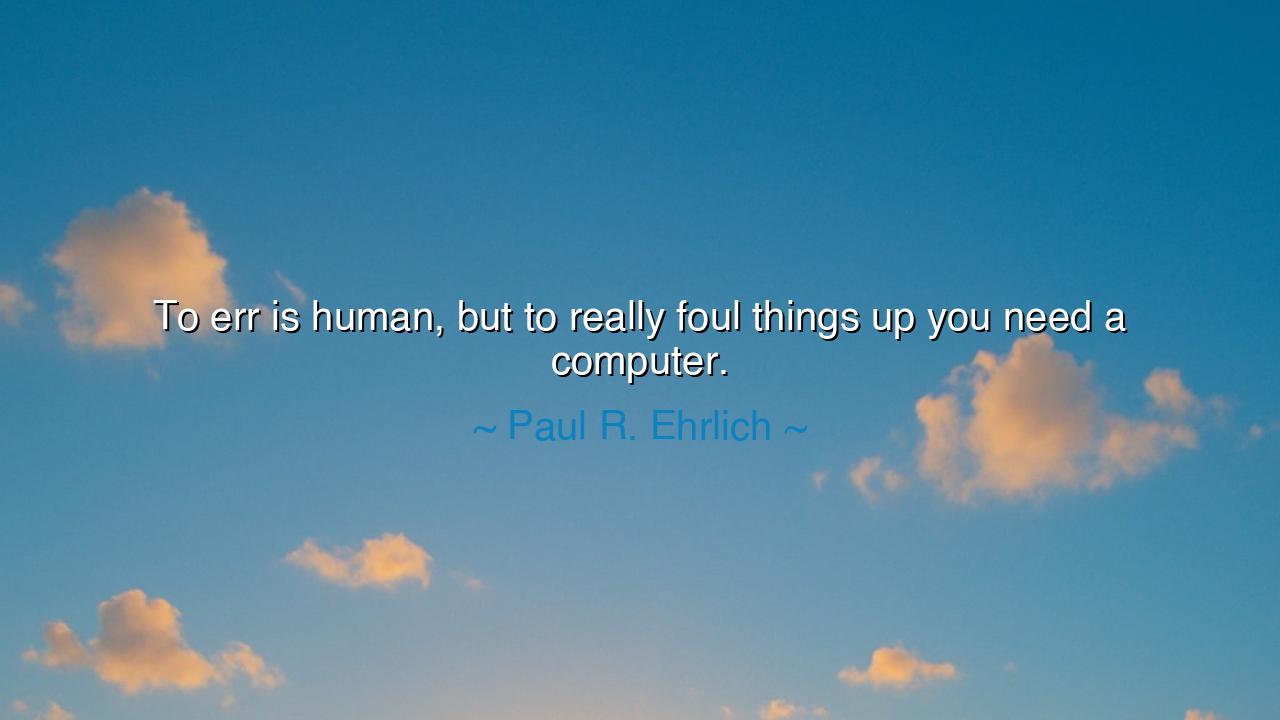
To err is human, but to really foul things up you need a






"To err is human, but to really foul things up you need a computer." These words, spoken by Paul R. Ehrlich, capture with wit and insight the paradox of our age—where technology, which is intended to simplify and enhance our lives, often introduces complexities and errors that are beyond our understanding. Ehrlich’s quote speaks not to the inherent flaw of humankind, but to the way in which machines, designed by human hands, can magnify our mistakes, making them not only more complicated but, in many cases, irreversible. It is a reflection on the limitations of technology and the overwhelming power it holds over our lives when misused or misunderstood.
The ancients knew well the truth that to be human is to err. Socrates, the great philosopher of Athens, taught that wisdom comes not from knowing all things, but from recognizing the limits of one's knowledge. To err is part of the very fabric of human existence—a reminder that we are fallible, imperfect beings. Human error has shaped the course of history, sometimes for good, sometimes for ill, but always with the possibility of growth and learning. And yet, the ancient world also recognized that mistakes must be met with reflection, understanding, and, when possible, rectification. The human mind may err, but it is also capable of finding solutions, learning from the past, and moving forward.
Paul Ehrlich’s statement, however, brings into sharp focus a modern phenomenon: the computer. The tools we have created to make our lives easier have, in many ways, introduced new layers of complexity. Where once a human mistake could be corrected with a simple change of course, now an error in a computer system can multiply exponentially. Consider the story of Y2K, the infamous computer glitch that threatened to bring the world’s systems to a halt at the turn of the millennium. It was a simple coding error—dates were stored as two digits, rather than four—and yet, it was feared that this mistake would cause global chaos. The error itself was human, but its consequences, magnified by computers, could have been catastrophic. This story encapsulates Ehrlich’s point: while humans err, it is technology that often takes these errors and magnifies them, turning small missteps into monumental failures.
Yet, Ehrlich’s quote is not merely a cautionary tale about computers; it is a reminder of the power we give to the tools we create. Just as Prometheus, in his myth, gave fire to humankind, a gift that could both warm and consume, so too have we given ourselves the power of computers, a tool that can illuminate and empower, but also one that can destroy if misused. The tragedy of Icarus, flying too close to the sun, is mirrored in our own technological ambition. We have soared high on the wings of machines, but without caution and wisdom, we risk falling to the ground in flames of our own making.
The lesson of Ehrlich’s quote is a profound one: to err is human, but to truly cause chaos, we need the aid of technology. Computers are powerful tools, but they must be wielded with care, wisdom, and humility. The temptation is to believe that because something is technologically advanced, it is infallible. Yet, as Ehrlich reminds us, it is precisely because of the power of computers that we must be cautious. A simple misstep in code, an error in data entry, or a flaw in machine learning can lead to consequences far beyond our control.
In our own lives, this lesson calls us to balance the potential of technology with the wisdom of the past. Embrace computers and technology, yes, but never lose sight of the human element that must guide them. We must not let our reliance on these tools blind us to the dangers of automation and artificial intelligence. Instead, we must use them wisely, understanding that they are only as good as the minds that create and guide them.
So, let us take Ehrlich’s warning to heart: don’t fear computers, but recognize that the power they hold can both create and destroy. In our pursuit of progress, let us not forget the lessons of the ancients, who understood that technology, when misused, can lead to disaster. Use computers wisely, with an understanding of their potential to both aid and hinder, and always remember that human oversight—with its capacity for reflection, compassion, and learning—must remain at the core of all our technological endeavors.






AAdministratorAdministrator
Welcome, honored guests. Please leave a comment, we will respond soon